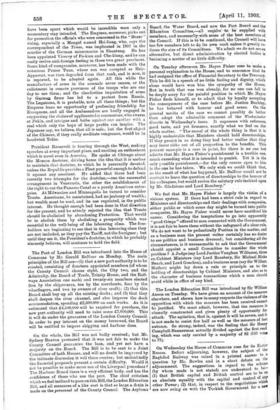On Tuesday afternoon Mr. Hayes Fisher rose to make a
personal explanation to the House, and to announce that he had resigned the office of Financial Secretary to the Treasury. This he did in a speech of no little feeling and dignity, which alone would have won him the sympathy of the House. But in truth that was won already, for no one can fail to be deeply sorry for the painful position in which Mr. Hayes Fisher finds himself, or to admit that by loyally accepting the consequences of the case before Mr. Justice Buckley, he has behaved with honour and good sense. On the general merits of the case we cannot possibly do better than adopt the admirable comment of the Westminster Gazette in Wednesday's issue. It expresses with reticence, good taste, and yet firmness, exactly what we feel on the
whole matter. The moral of the whole thing is that it is highly undesirable that Ministers should hold directorships. If they persist in so doing they had better realise that they may incur risks out of all proportion to the benefits. This present example is a case in point, for there is no one but admits that Mr. Hayes Fisher's punishment is a terrible one, much exceeding what it is intended to punish. Yet it is the only possible punishment,—for the only course open to him is the one he has taken. We only wish we could think that, as the result of what has happened, Mr. Balfour would not be content to leave the question of directorships to the honour of his colleagues, but would revive the salutary rule insisted upon by Mr. Gladstone and Lord Rosebery."






































 Previous page
Previous page